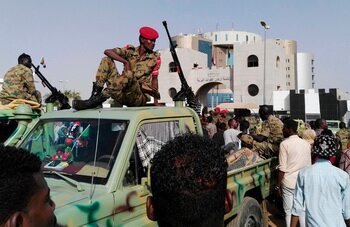
Roman Kot
April 11, 2019, a military coup took place in Sudan, during which Omar al-Bashir, the country's President, was removed from his post. Besides, the Sudanese military disbanded the Cabinet and the Parliament of the country — the National Assembly, and also announced a three-month state of emergency to be followed by a two-year transitional period. Also, state Sudanese media reported that all political prisoners, including the leaders of the protests taking place in the country, were released from prison.
This is the end of the thirtieth year of Omar al-Bashir's staying in power and, along with the resignation of Abdelaziz Bouteflika in Algeria, is an event that puts a full stop in the changing of generations of ruling elites in the Middle East. At the same time, the developments in Sudan against the background of a sharp political and economic crisis, can be one of the factors of further destabilization throughout the region.
Sudan, despite its seemingly being far from top global centers of power, is a key state in ensuring the national security of Egypt. Khartoum is an important actor in the issue of the distribution of waters of the Nile and a key subject of talks with Ethiopia on the work of the Hidase (from Amharic — “revival”) Dam. Khartoum's position on this issue is a key one because of the geopolitical position of the country.
|
Note: The construction of Hidase HPP began in 2011 on the Blue Nile, near Ethiopia's border with Sudan. After launching all the turbines, the Ethiopian hydroelectric power station will be the largest on the African continent, and its design capacity is 6.45 GW. For the hydroelectric power station to work, it is necessary to create a reservoir with a total volume of 74–79 cubic kilometers, the filling of which in the next few years after the commissioning of the dam would cause a sharp drop in the Nile water supply for Egypt and, to a lesser extent, for Sudan, which could lead to catastrophic socio-economic impacts. It is planned that the HPP will be commissioned in 2022. |
Egypt, in turn, is one of the largest markets for Ukrainian agricultural products. According to the results of 2018, Ukraine exported there food worth 888 million US dollars,. which makes Egypt the fifth largest importer of Ukrainian grain after India, China, the Netherlands and Spain. In view of this, the dynamics of developments in that country deserves special attention.
Forecasts and Recommendations
Sudan's coping with the political crisis will depend on whether the new government manages: 1) to incorporate (at least partially) the opposition into power and to minimize protests; 2) to attract external financing to improve the economic situation in the country.
Most of the officers who now lead the military junta in Khartoum, are related to the pro-Saudi faction in the Sudanese army. In particular, Abdel Fattah Abdelrahman Burhan commanded the Sudanese contingent in Yemen, who fought on the side of the Gulf monarchies, and was also Sudan's Attache in China. In view of this, Saudi Arabia and the OAU are the most likely donors to Sudan.
At the same time, it should be noted that the protesters have nothing to do with the coup. The Sudanese Professionals Association, which led the protests, has called not to stop the demonstrations, as the protesters' demands include the resignation of not only Omar al-Bashir, but of his entire circle. In a statement of April 15, the Association, among other things, called to continued actions: “We will never veer away from the revolutionary path, and we vow to give our people their deserved upper hand over the “remaining lot” of the regime”.
Taking into consideration all the above said, as well as the importance for Ukraine of relations with Egypt and Saudi Arabia, it is expedient to refrain from commenting on the events in Sudan and not to support either a new military leadership of the country or the protesting opposition. Besides, we should focus on the human rights and humanitarian aspects of the crisis in Sudan at international forums and organizations, especially in the United Nations.

